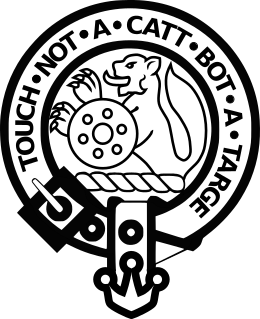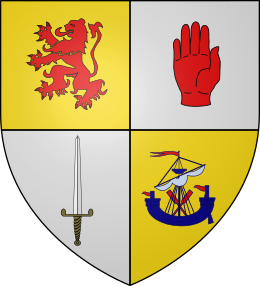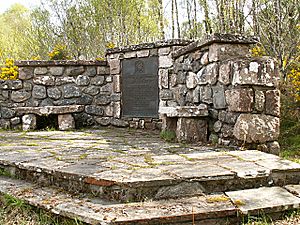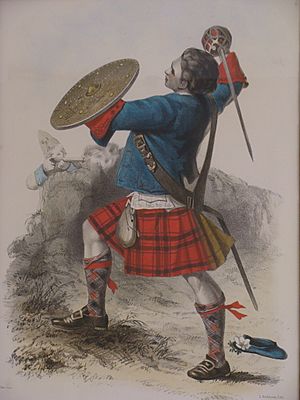Clan MacBean facts for kids
Quick facts for kids Clan MacBean |
|||
|---|---|---|---|
| MacBheathain | |||

Crest: Wildcat holding a shield known as a Targe
|
|||
| Motto | Touch Not A Catt Bot A Targe | ||
| War cry | Kinchyle | ||
| Profile | |||
| Region | Highland | ||
| District | Inverness | ||
| Plant badge | Boxwood or red whortleberry | ||
| Animal | Scottish Wildcat | ||
| Chief | |||
 |
|||
| Richard McBain of McBain | |||
| 23rd Chief of the Clan MacBean | |||
| Historic seat | Kinchyle in the parish of Dores, Inverness-shire. Faillie, in Strathnairn, and Tomatin, in Strathdearn. | ||
|
|||
|
|||
|
|||
|
|||
Clan MacBean (also known as Clan MacBain) is a historic Scottish clan from the Highlands. It is a proud member of Clan Chattan, a large group of allied clans. The clan's motto, Touch Not A Catt Bot A Targe, means "Don't touch a wildcat without a shield." This refers to the fierce Scottish Wildcat found in their crest.
Contents
History of Clan MacBean
What Does the Name MacBean Mean?
The name MacBean has a few possible origins from Gaelic. One idea is that it comes from bheathain, meaning "lively one." Another possibility is Bàn, which means "Fair" or "White" in English. This might have referred to someone with light hair or a pale face, like King Donald Bàn.
However, the most trusted origin comes from Dr. Alexander MacBain, a Gaelic expert. He believed the name MacBheathain comes from Beathan, meaning "life's son." This is the origin that Clan MacBean follows today.
Some MacBeans later dropped the "Mac" or "Mc" from their name, becoming "Bean" or "Bain." This can sometimes cause confusion with the Bains of Tulloch, who are a different family connected to Clan Mackay.
Early Days of the Clan
The MacBeans are believed to be descendants of Gillichattan Mor, the founder of Clan Chattan. This means they are part of a very old and important group of clans.
One of the earliest records of the clan mentions Bean McCoil voir and his son, Milmoir McBean. Historians say the MacBean lands were mainly around the area of Dores, near Inverness. They also had lands in Strathnairn and Strathdearn.
The MacBeans were known for their loyalty to the Clan Mackintosh chiefs, who led Clan Chattan. An old manuscript tells a story from around 1334. It says that Myles Mac-Bean vic-Coil-Mor and his four sons joined William Mackintosh, seeking his protection. This shows that the MacBeans were one of the first and oldest families to join Clan Chattan.
Clan MacBean in Battles
The Clan MacBean fought alongside the rest of Clan Chattan at the Battle of Harlaw in 1411. This was a very important battle in Scottish history. Sadly, the MacBeans suffered heavy losses there. The Mackintosh history records that they "mourned the loss of so many of his friends and people, especially of Clan Vean."
In the 17th century, the clan faced some challenges. The 12th chief, Paul MacBean, had to give up his lands because of debts around 1685. But his son, William MacBean, got the lands back in the same year.
The Jacobite Risings and Culloden
Many MacBeans supported the Jacobite rising of 1715. This was a rebellion to bring the Stuart kings back to the throne. Because of their support, many MacBeans were sent away to plantations in America.
However, this didn't stop Gillies MacBean (also known as Gillies Mor MacBean) from fighting in the Jacobite rising of 1745. Gillies was the second son of the 12th chief, William MacBean of Kinchyle. He became a major and fought bravely at the famous Battle of Culloden.
Gillies MacBean was a very tall man, said to be over six feet four inches! During the battle, he saw enemy soldiers breaking through the Highlander lines. Gillies bravely jumped into the gap and fought them off, cutting down many soldiers with his back to a wall. An officer from the government side even tried to save him because of his incredible bravery, but Gillies was killed.
Another MacBean is said to have helped the wounded chief of Clan Cameron escape after the battle. Yet another MacBean, Aeneas MacBean, managed to get away by repeatedly leaping across a stream until his pursuers gave up.
After the Battle of Culloden, the clan chief struggled to keep their lands, and they were sold in 1760.

Famous MacBeans in Later Times
The MacBean clan has produced many notable people, especially in the military.
- William MacBean was an extraordinary soldier who started as a private and rose all the way to Major General. He won the Victoria Cross, a very high award for bravery, during the Indian Mutiny in 1858.
- Forbes MacBean (born 1857) was another famous military figure. He was recognized for his courageous actions in 1897 while serving as a Major in the Gordon Highlanders. He later commanded the Gordon Highlanders against the Boers in South Africa during the Second Boer War. He was known for his extensive experience in tough battles.
The Clan in Modern Times
Today, the chiefly line of Clan MacBean continues to thrive, with many members living in Canada and the United States.
The current chief, Richard McBain of McBain, became the 23rd Hereditary Chief of the Clan MacBean in 2022. A special ceremony was held in Inverness-shire to officially recognize him as chief. At this event, a new memorial was also dedicated to Captain LaVern Bean, a famous astronaut from the clan. The next day, wreaths were laid at the Culloden Memorial Cairn to remember the brave clansmen who fought and died there.
Notable Descendants You Might Know
- Captain Alan Bean was an astronaut and the fourth person to walk on the Moon in 1969. He took a piece of the MacBean tartan with him on his mission to the Moon! He later gave pieces of this tartan to the Clan MacBean and to the St. Bean Chapel in Scotland.
- Judge Roy Bean was an American saloon-keeper and Justice of the Peace. He was known as "The Only Law West of the Pecos" in Texas. He held court in his saloon and became famous for his unique way of applying the law. He was nicknamed "The Hanging Judge," though he only sentenced two men to hang.
Chiefs' Historic Home
The historic home of the chiefs of Clan MacBean was Kinchyle. It is located about six miles southwest of Inverness. The chiefs lived there until the lands were sold in 1759.
See also
 | Sharif Bey |
 | Hale Woodruff |
 | Richmond Barthé |
 | Purvis Young |


